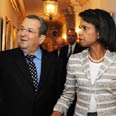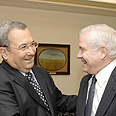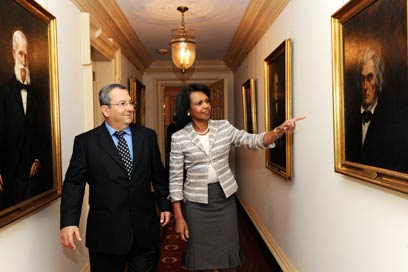

WASHINGTON – After a series of meetings with top US officials in Washington, Defense Minister Ehud Barak appeared optimistic as to the improvement of Israel's anti-missile defense systems.
After some lobbying on Barak's part, the American officials pledged Israel would be connected to the global US system, capable of detecting an impending attack while the missile's engine is just heating up. Israel is primarily intent on obtaining logistical support from the US, which would allow the IDF to launch a solo operation if need be.
"In just a few months Israel will be stronger and better prepared in its defenses against long-range missiles," Barak said on Wednesday.
The achievement is the culmination of Barak's meetings with Vice President Dick Cheney, Secretary of Defense Robert Gates, Secretary of State Condoleezza Rice, and Chairman of the Joint Chiefs of Staff, Admiral Michael Mullen.
The Iranian threat topped the agendas of the majority of Barak's meetings, with the minister clarifying that as far as Israel is concerned "all options are still on the table."
At a press conference with Israeli reporters after the meetings, Barak explained that "it was important for the Americans to understand our stance and its derivatives, and I think they understand this better now, after this visit."
Barak arrived in the US capital on Monday as part of an attempt to improve Israel's qualitative military advantage and to convince the US government not to drop the option of a military strike on Iran. The US promised to assist Israel in its defense.

Barak with Rice. (Photo: Ariel Hermoni, Defense Ministry)
As part of this assistance, the US will deploy a radar system in Israel that will give preliminary warnings on the deployment of enemy missiles, and also upgrade Israel's access to an advanced American missile-defense system, which will allow Israel to detect ballistic missile-related activity in its early stages.
In addition, the meetings concluded that the US would help fund and develop 'Iron Dome', a defense system that will provide protection against Qassam rockets and mortar shells. Another project to receive funding is 'Arrow 3', Israel's newest line of defense against ballistic missiles.
An Israeli defense official said that during Barak's meeting with Gates the latter expressed the US' willingness to supply Israel with the tools it needs in order to build up a qualitative defense and maintain its strategic advantage in the region.
A joint statement published after the meeting stressed the cooperation between the two countries in matters of Israel's defense, and said that the strategy implemented would take into consideration the regional threats to the State. Gates promised Barak that the US would continue to provide different options for Israel's protection and attempt to improve its advantage, including the different missile-defense systems discussed.
In response to the professed commitment Barak said, "The systems will vastly improve Israel's defense and its abilities against the Iranian threat. We are talking about a long-ranging radar and our incorporation within a defense system that can recognize a missile threat within seconds.
"In this respect, the Americans have fulfilled their commitment to maintain Israel's qualitative advantage in the region, as well as its defense against the Iranian threat."















